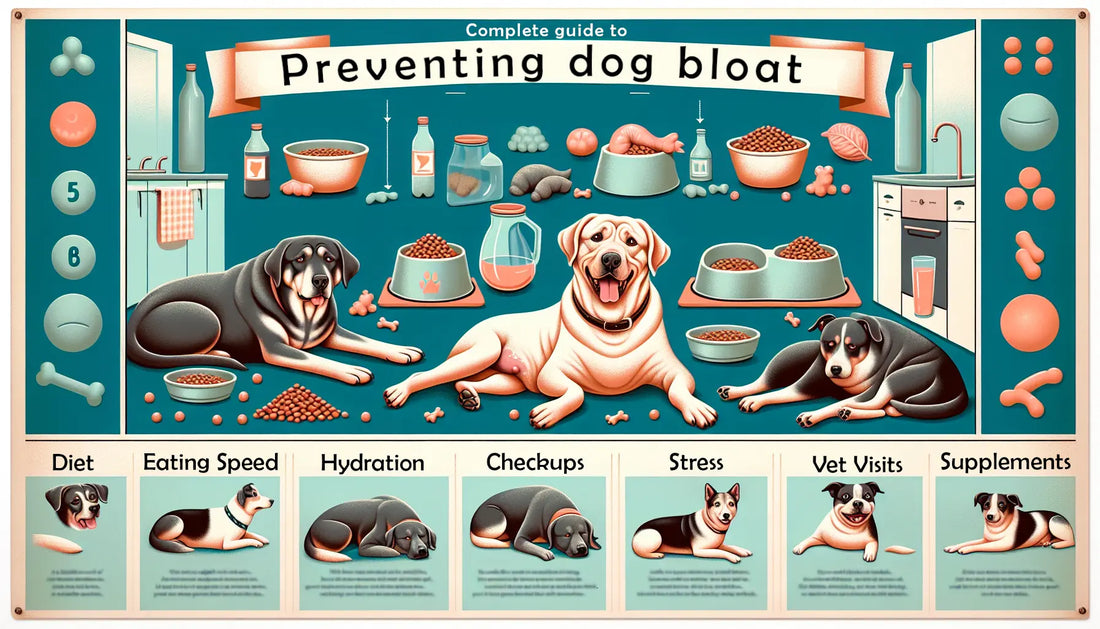Think of a spritely Labrador Retriever, your faithful companion, exhibiting unusual signs like excessive drooling and restlessness. To an untrained eye, they might seem unremarkable but could possibly indicate a serious and potentially fatal condition-Dog Bloat. Preventing bloat, also known as gastric dilatation-volvulus (GDV), in dogs is an urgent and significant concern that often goes unnoticed.
Understanding Dog Bloat
Dog Bloat is a severe, life-threatening condition characterized by rapid stomach enlargement that may lead to twisting or flipping of the stomach. It commonly affects deep-chested breeds like the Staffordshire Bull Terrier, Labrador Retriever, and Greyhound but can happen to any breed including the compact Shih Tzu. Lifestyle and dietary changes significantly contribute to bloat prevention.
5 Signs of Dog Bloat
- Distended Abdomen: A bloated stomach visually appears large and feels tight when touched.
- Retching or Attempts to Vomit: A dog with bloat will often be unsuccessful at vomiting despite repeated attempts.
- Restlessness: Dogs suffering from bloat are often anxious and unable to lie down comfortably.
- Excessive Drooling: A significant increase in saliva is characteristic of dog bloat.
- Pale Gums and Rapid Heartbeat: A noticeable change in gum color and accelerated heart rate may indicate shock, often linked with bloat.

Top 5 Ways to Prevent Dog Bloat
- Good Diet: Feed your dog a balanced diet rich in fibre, and avoid foods that cause gas.
- Eat Slowly: Encourage your dog to consume food slowly. Using a slow-feeder bowl helps prevent swallowing air.
- Ensure Hydration: Hydration is key for good digestion. Always have fresh water readily available for your dog.
- Reduce Stress: Stress can potentially contribute to bloat. Help keep your dog calm with regular exercise and a stable routine.
- Vet Check-Ups: Regular veterinary check-ups are paramount. The vet can provide tips customized to your dog's particular needs.
Role of Herbal Supplements in Bloat Prevention
Herbal supplements act as powerful aids in enhancing digestion and combating bloat. Herbs like ginger, chamomile, and fennel have been traditionally acknowledged for their medicinal properties, and are advantageous in managing bloating and gas. Simply including these supplements in your dog's diet could greatly contribute to their digestive health.
How to Incorporate Herbal Supplements in Your Dog's Diet
Herbal supplements are versatile and can be easily incorporated into your dog's diet. You can add these to meals, treats, or make a herbal tea for your pet. Introducing these slowly and in small amounts, while observing your dog's response, are excellent ways to incorporate these beneficial herbs. Easier would be to use pre-made herbal supplement dog treats.
Conclusion
Understanding and recognizing the signs of dog bloat, employing preventive methods, and leveraging the power of herbal supplements is a proactive approach to your pet's health. A supplement that includes other active ingredients works synergistically to enhance overall health. Our natural herbal treats are just £19.99 with free delivery and come with a money-back guarantee and UK-based customer care team


